Unit3 How do you get to school? 单元综合复习课件(共23张PPT)
文档属性
| 名称 | Unit3 How do you get to school? 单元综合复习课件(共23张PPT) |  | |
| 格式 | zip | ||
| 文件大小 | 945.2KB | ||
| 资源类型 | 试卷 | ||
| 版本资源 | 人教新目标(Go for it)版 | ||
| 科目 | 英语 | ||
| 更新时间 | 2023-03-06 10:01:33 | ||
图片预览

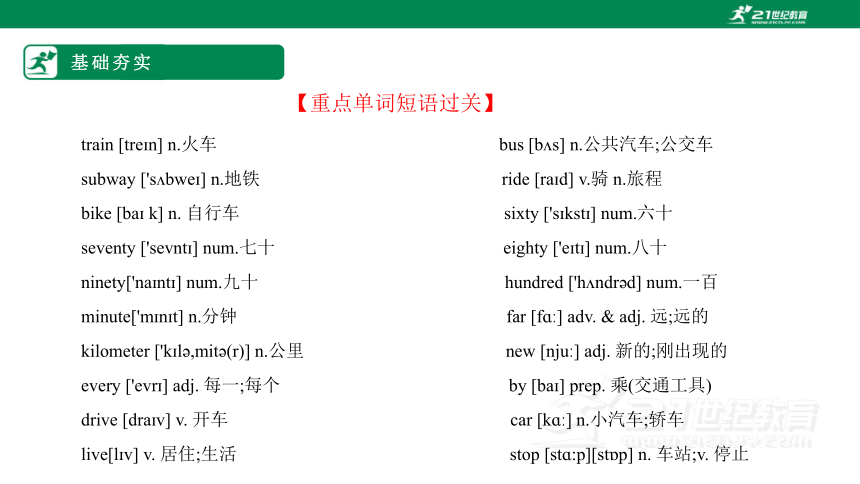
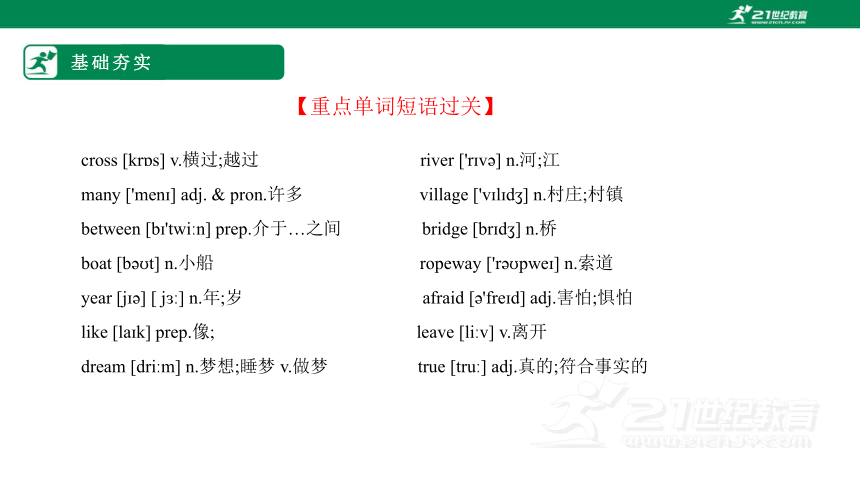
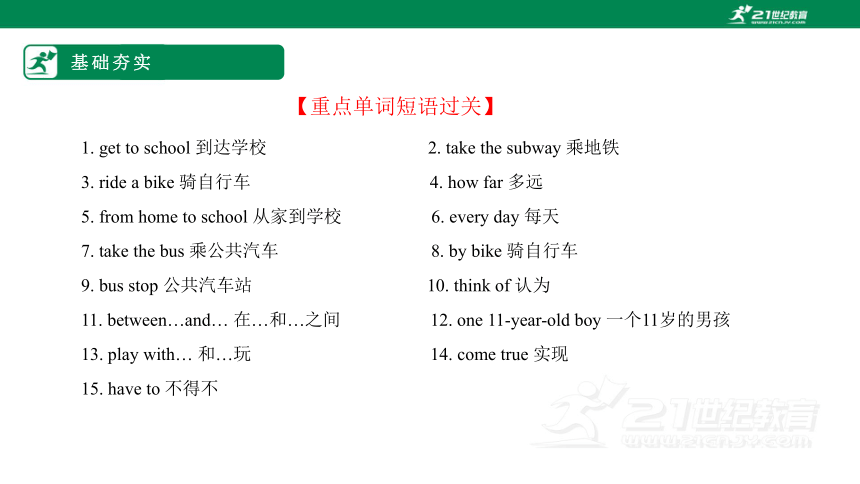
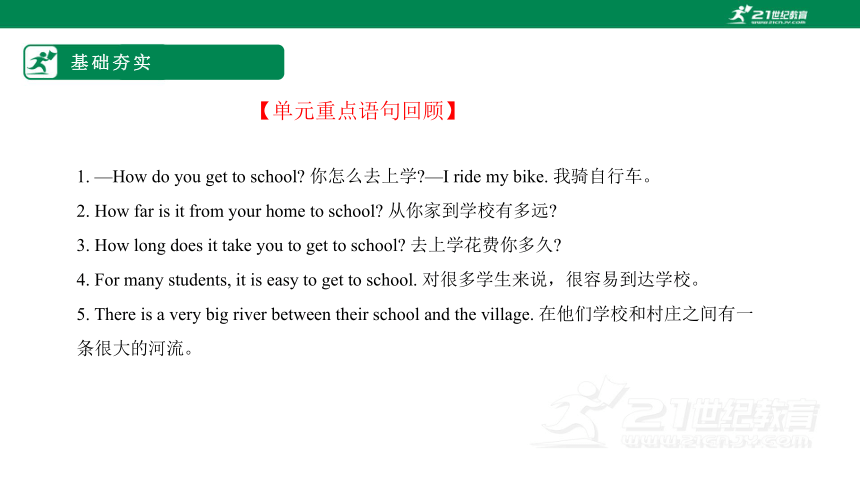
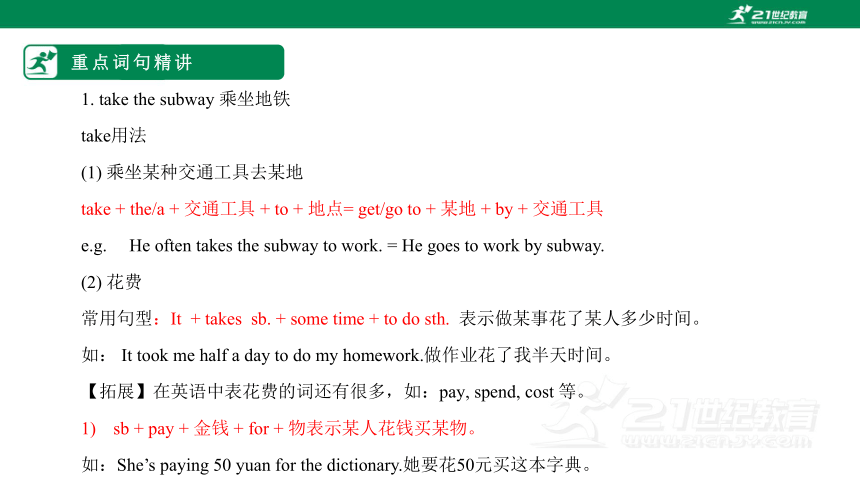
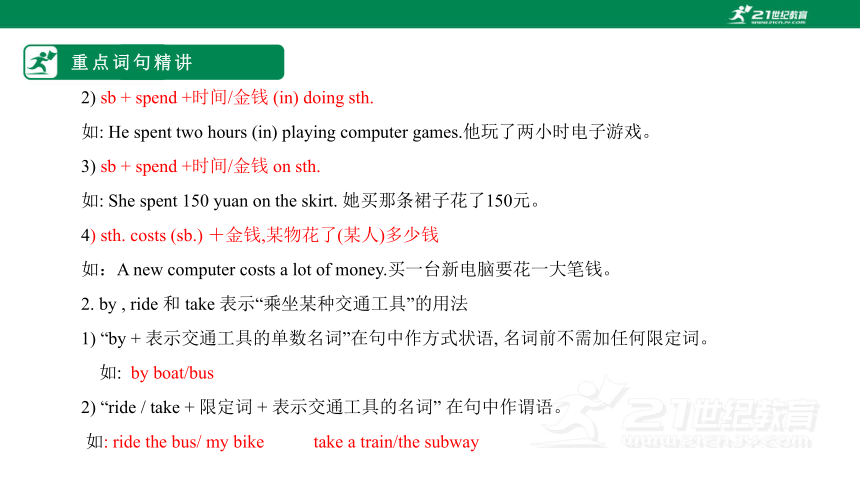
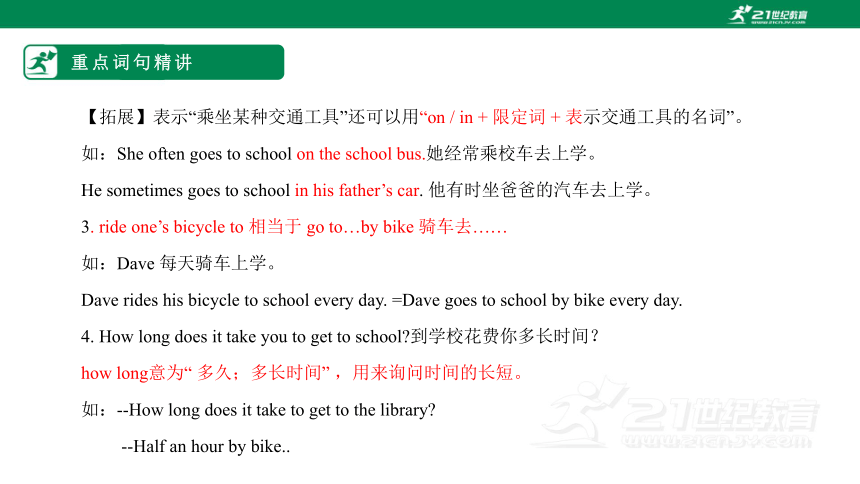
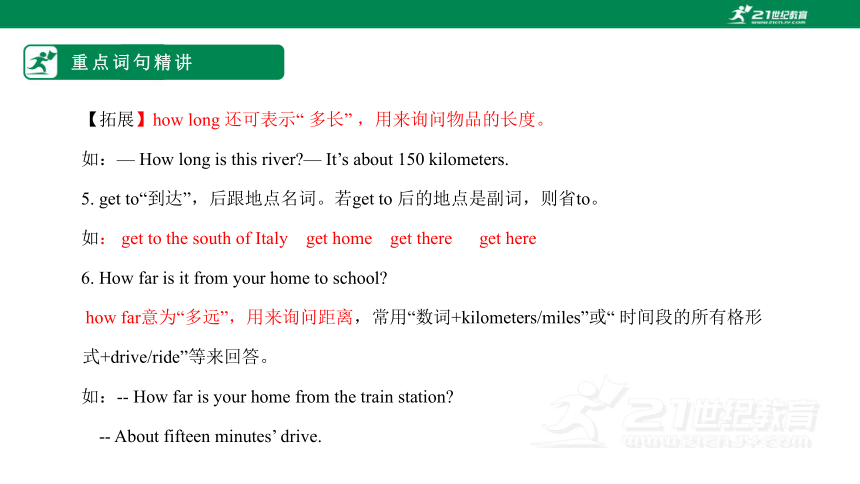
文档简介
(共23张PPT)
Unit3 单元综合复习
人教版英语七年级下册
基础夯实
train [tre n] n.火车 bus [b s] n.公共汽车;公交车
subway ['s bwe ] n.地铁 ride [ra d] v.骑 n.旅程
bike [ba k] n. 自行车 sixty ['s kst ] num.六十
seventy ['sevnt ] num.七十 eighty ['e t ] num.八十
ninety['na nt ] num.九十 hundred ['h ndr d] num.一百
minute['m n t] n.分钟 far [fɑ ] adv. & adj. 远;远的
kilometer ['k l ,mit (r)] n.公里 new [nju ] adj. 新的;刚出现的
every ['evr ] adj. 每一;每个 by [ba ] prep. 乘(交通工具)
drive [dra v] v. 开车 car [kɑ ] n.小汽车;轿车
live[l v] v. 居住;生活 stop [stɑ:p][st p] n. 车站;v. 停止
【重点单词短语过关】
基础夯实
cross [kr s] v.横过;越过 river ['r v ] n.河;江
many ['men ] adj. & pron.许多 village ['v l d ] n.村庄;村镇
between [b 'twi n] prep.介于…之间 bridge [br d ] n.桥
boat [b t] n.小船 ropeway ['r pwe ] n.索道
year [j ] [ j ] n.年;岁 afraid [ 'fre d] adj.害怕;惧怕
like [la k] prep.像; leave [li v] v.离开
dream [dri m] n.梦想;睡梦 v.做梦 true [tru ] adj.真的;符合事实的
【重点单词短语过关】
基础夯实
1. get to school 到达学校 2. take the subway 乘地铁
3. ride a bike 骑自行车 4. how far 多远
5. from home to school 从家到学校 6. every day 每天
7. take the bus 乘公共汽车 8. by bike 骑自行车
9. bus stop 公共汽车站 10. think of 认为
11. between…and… 在…和…之间 12. one 11-year-old boy 一个11岁的男孩
13. play with… 和…玩 e true 实现
15. have to 不得不
【重点单词短语过关】
基础夯实
1. —How do you get to school 你怎么去上学 —I ride my bike. 我骑自行车。
2. How far is it from your home to school 从你家到学校有多远
3. How long does it take you to get to school 去上学花费你多久
4. For many students, it is easy to get to school. 对很多学生来说,很容易到达学校。
5. There is a very big river between their school and the village. 在他们学校和村庄之间有一条很大的河流。
【单元重点语句回顾】
重点词句精讲
1. take the subway 乘坐地铁
take用法
(1) 乘坐某种交通工具去某地
take + the/a + 交通工具 + to + 地点= get/go to + 某地 + by + 交通工具
e.g. He often takes the subway to work. = He goes to work by subway.
(2) 花费
常用句型:It + takes sb. + some time + to do sth. 表示做某事花了某人多少时间。
如: It took me half a day to do my homework.做作业花了我半天时间。
【拓展】在英语中表花费的词还有很多,如:pay, spend, cost 等。
sb + pay + 金钱 + for + 物表示某人花钱买某物。
如:She’s paying 50 yuan for the dictionary.她要花50元买这本字典。
重点词句精讲
2) sb + spend +时间/金钱 (in) doing sth.
如: He spent two hours (in) playing computer games.他玩了两小时电子游戏。
3) sb + spend +时间/金钱 on sth.
如: She spent 150 yuan on the skirt. 她买那条裙子花了150元。
4) sth. costs (sb.) +金钱,某物花了(某人)多少钱
如:A new computer costs a lot of money.买一台新电脑要花一大笔钱。
2. by , ride 和 take 表示“乘坐某种交通工具”的用法
1) “by + 表示交通工具的单数名词”在句中作方式状语, 名词前不需加任何限定词。
如: by boat/bus
2) “ride / take + 限定词 + 表示交通工具的名词” 在句中作谓语。
如: ride the bus/ my bike take a train/the subway
重点词句精讲
【拓展】表示“乘坐某种交通工具”还可以用“on / in + 限定词 + 表示交通工具的名词”。
如:She often goes to school on the school bus.她经常乘校车去上学。
He sometimes goes to school in his father’s car. 他有时坐爸爸的汽车去上学。
3. ride one’s bicycle to 相当于 go to…by bike 骑车去……
如:Dave 每天骑车上学。
Dave rides his bicycle to school every day. =Dave goes to school by bike every day.
4. How long does it take you to get to school 到学校花费你多长时间?
how long意为“ 多久;多长时间” ,用来询问时间的长短。
如:--How long does it take to get to the library
--Half an hour by bike..
重点词句精讲
【拓展】how long 还可表示“ 多长” ,用来询问物品的长度。
如:— How long is this river — It’s about 150 kilometers.
5. get to“到达”,后跟地点名词。若get to 后的地点是副词,则省to。
如: get to the south of Italy get home get there get here
6. How far is it from your home to school
how far意为“多远”,用来询问距离,常用“数词+kilometers/miles”或“ 时间段的所有格形式+drive/ride”等来回答。
如:-- How far is your home from the train station
-- About fifteen minutes’ drive.
重点词句精讲
7.think of 认为
例句:What does Bob think of the trip 鲍勃认为旅行怎么样?
【拓展】
What do/does sb. think of … = How do/does sb. like… 某人觉得……怎么样?
例句:How does Bob like the trip
8. 含 take 的短语
take exercise 运动; 锻炼 take a walk 散步
take a look (at) 看一看 take down 取下
take a seat 坐下,坐坐 take out 拿出
take a rest 休息 take away 拿走
take a vacation 度假 take off (脱掉;飞机等) 起飞
take photos 照相,拍照
重点词句精讲
9. There is a very big river between their school and the village.
1) there be侧重于客观存在的“有”,强调存在的状态。在there be结构中,主语应放在be动词之后,并且be动词的形式应与主语保持一致。
如:There are many apples on the tree.
【拓展】
have侧重于主观方面,强调“所属” 关系,表示“拥有,占有,具有”。在这一结构中,have与主语保持人称和数的一致。
如:She has a nice schoolbag.
2)between … and … 在……与……之间
between 是个介词,表示在两者之间。
如:Mary is between Jane and Linda in the line.在队伍中,玛丽在简和琳达之间。
重点词句精讲
10. There is no bridge and the river runs too quickly for boats.河上根本没有桥,而且水流很急,不适宜小船摆渡。
(1) no “完全不、根本没有”,在这里 构成否定句。当no 用于构成否定句,主要
用于名词前,强调否定其后面的名词。
如:There is no apple in the fridge. 冰箱里没有苹果了。
(2) run 在这里表示“液体流动”。它在不同的语境中有不同的用法和含义。
例如:
Who runs the business 生意是谁经营的
“run”表示 “管理;经营”
② John run a car into a park. 约翰把车开进了公园。
“run”表示 “使行驶;驾驶”
重点词句精讲
③ The road runs north.这条路伸向北方。
“run”表示 “延伸”
④ “run” 可以做名词 “奔跑,路程”
Let’s go for a run across the field. 咱们去跑步,跑过那片田野吧。
It is an hour’s run by train from here to London. 从此地到伦敦搭火车有一小时的行程。
11. One 11-year-old boy, Liangliang, crosses the river every school day.一个11岁的男孩—亮亮,每天过河上学 。
11-year-old 为多个词汇构成的复合形容词,用连 字符“-”连接,用来修饰名词 boy。这种结构还有很多。
例如:a four-day trip 一个四天的旅行
a 30-page book 一本30页的书
注意:这里的“year,day,page”都是用单数。
重点词句精讲
12. But he is not afraid because he loves school.
afraid adj. 害怕;恐惧 ;
(1)be afraid...害怕的
The girl is very afraid. 小女孩很害怕。
(2)be afraid of … 害怕 ……
My sister is afraid of snakes. 我妹妹害怕蛇。
13. He’s like a father to me.
like 在这里作介词,而不是动词,意为“像”。
The fish looks like a big boat.那条鱼看起来像条船 。(介词)
Jane likes history very much.简很喜欢历史。 (动词)
语法知识精讲
【总结】关于 how 的用法
how adv. 指范围、程度、数量、价值等的“多少、多么”。
用于疑问句中,表示身体怎样。
How is your brother 你哥哥身体好吗?
2) (指方式、方法)怎样,怎么
How did you climb to the top of that building 你是如何爬上楼顶的?
How do you get to school 你是如何去学校的?
当询问交通方式的时候回答方式有两种:
A: 某人 + take(s) + the 交通工具 + to 某地。
B: 某人 + get(s) to 某地 + by 交通工具
例如:My uncle takes the plane to Hong Kong.我叔叔乘飞机去香港。
My uncle gets to Hong Kong by plane. 我叔叔乘飞机去香港。
语法知识精讲
3) 用于惊叹句中,表示多么……
How well you look!你看起来多么健康啊!
How I wish to have a long vacation these days! 这些天我多么希望去度一次长假啊!
4) how后面可以和其它词连用,对不同的对象进行提问。
①对时间段提问 How long
例如:How long does it take to walk to school
How long does it take to do her homework
②对两地间的距离提问下列句型:
How far + is it from 某地 to某地?
例如:
How far is it from his home to the clothes store 从他家到服装店多远?
How far is it from Beijing to Shanghai 从北京到上海有多远?
【拓展】How long 还可以用来询问长度。
如:How long is the Yellow River 黄河有多长?
实战演练
一、所给单词的适当形式填空
1.Let's meet at the bus ________(stop).
2.The ______(village) are happy to have a bridge here.
3.Look at the family photo.Gina is _ (between)her father and mother.
4.Old Henry is ninety ________ (year) old,but he's very healthy.
5.There are always __ _ (many)people in the shop on weekends.
6.I can't ________ (drive) a car.Can you teach me
7.It's his dream _________ (be) a basketball star.
8.It's not easy __ __ (cross) the river on a ropeway.
9.What about __ __ (ride) the bikes to the park
10.It makes my brother an hour __ (finish) his homework.
【答案】1. stop 2.villagers 3.between 4.years 5.many 6.drive 7.to be 8.to cross
9.riding 10.to finish
实战演练
二、根据句意及首字母提示写单词
11.Look!There are some boats in the r_________.
12.Tony likes reading and he has m_________ books.
13.Mr. Hu is my favorite teacher.He's l_________ a father to me.
14.I'm a_________ Ms. Li is not at home now.
15.It's 6:30 p.m. It's time to go home.I must l_________ now.
【答案】11. river 12.many 13.like 14.afraid 15.leave
实战演练
三、根据句意及汉语提示完成句子。
16.What do you ________ ________ (认为) the school show
17.I think your dream can ________ ________ (实现) soon.
18.________ ________ (因……而感谢) helping me with my English.
19.How far is it from your home to the ________ ________ (火车站)
20.Do you go to Dalian by bus or ________ ________ (乘火车)
【答案】16. think of e true 18.Thanks for 19.train station 20.by train
实战演练
四、单项选择。
21.Kate is ____ girl.She's very happy at school.
A.a eighteen year old B.an eighteen year old
C.an eighteen years old D.a eighteen years old
22.—What are you going to do when you grow up
—My ____ is to become a teacher.
A.hobby B.dream C.job D.idea
23.The workers will build a new railroad ____ the two cities.
A.since B.between C.as D.During
24.There are no ____ now,so we can't cross the river.
A.boats B.cars C.trains D.subways
25.It ____ Wang Lin ten minutes ____ home.
A.take,to walk B.takes,walking C.takes,to walk
【答案】BBBAC
That's all.Thank you!
谢谢
21世纪教育网(www.21cnjy.com)
中小学教育资源网站
兼职招聘:
https://www.21cnjy.com/recruitment/home/admin
Unit3 单元综合复习
人教版英语七年级下册
基础夯实
train [tre n] n.火车 bus [b s] n.公共汽车;公交车
subway ['s bwe ] n.地铁 ride [ra d] v.骑 n.旅程
bike [ba k] n. 自行车 sixty ['s kst ] num.六十
seventy ['sevnt ] num.七十 eighty ['e t ] num.八十
ninety['na nt ] num.九十 hundred ['h ndr d] num.一百
minute['m n t] n.分钟 far [fɑ ] adv. & adj. 远;远的
kilometer ['k l ,mit (r)] n.公里 new [nju ] adj. 新的;刚出现的
every ['evr ] adj. 每一;每个 by [ba ] prep. 乘(交通工具)
drive [dra v] v. 开车 car [kɑ ] n.小汽车;轿车
live[l v] v. 居住;生活 stop [stɑ:p][st p] n. 车站;v. 停止
【重点单词短语过关】
基础夯实
cross [kr s] v.横过;越过 river ['r v ] n.河;江
many ['men ] adj. & pron.许多 village ['v l d ] n.村庄;村镇
between [b 'twi n] prep.介于…之间 bridge [br d ] n.桥
boat [b t] n.小船 ropeway ['r pwe ] n.索道
year [j ] [ j ] n.年;岁 afraid [ 'fre d] adj.害怕;惧怕
like [la k] prep.像; leave [li v] v.离开
dream [dri m] n.梦想;睡梦 v.做梦 true [tru ] adj.真的;符合事实的
【重点单词短语过关】
基础夯实
1. get to school 到达学校 2. take the subway 乘地铁
3. ride a bike 骑自行车 4. how far 多远
5. from home to school 从家到学校 6. every day 每天
7. take the bus 乘公共汽车 8. by bike 骑自行车
9. bus stop 公共汽车站 10. think of 认为
11. between…and… 在…和…之间 12. one 11-year-old boy 一个11岁的男孩
13. play with… 和…玩 e true 实现
15. have to 不得不
【重点单词短语过关】
基础夯实
1. —How do you get to school 你怎么去上学 —I ride my bike. 我骑自行车。
2. How far is it from your home to school 从你家到学校有多远
3. How long does it take you to get to school 去上学花费你多久
4. For many students, it is easy to get to school. 对很多学生来说,很容易到达学校。
5. There is a very big river between their school and the village. 在他们学校和村庄之间有一条很大的河流。
【单元重点语句回顾】
重点词句精讲
1. take the subway 乘坐地铁
take用法
(1) 乘坐某种交通工具去某地
take + the/a + 交通工具 + to + 地点= get/go to + 某地 + by + 交通工具
e.g. He often takes the subway to work. = He goes to work by subway.
(2) 花费
常用句型:It + takes sb. + some time + to do sth. 表示做某事花了某人多少时间。
如: It took me half a day to do my homework.做作业花了我半天时间。
【拓展】在英语中表花费的词还有很多,如:pay, spend, cost 等。
sb + pay + 金钱 + for + 物表示某人花钱买某物。
如:She’s paying 50 yuan for the dictionary.她要花50元买这本字典。
重点词句精讲
2) sb + spend +时间/金钱 (in) doing sth.
如: He spent two hours (in) playing computer games.他玩了两小时电子游戏。
3) sb + spend +时间/金钱 on sth.
如: She spent 150 yuan on the skirt. 她买那条裙子花了150元。
4) sth. costs (sb.) +金钱,某物花了(某人)多少钱
如:A new computer costs a lot of money.买一台新电脑要花一大笔钱。
2. by , ride 和 take 表示“乘坐某种交通工具”的用法
1) “by + 表示交通工具的单数名词”在句中作方式状语, 名词前不需加任何限定词。
如: by boat/bus
2) “ride / take + 限定词 + 表示交通工具的名词” 在句中作谓语。
如: ride the bus/ my bike take a train/the subway
重点词句精讲
【拓展】表示“乘坐某种交通工具”还可以用“on / in + 限定词 + 表示交通工具的名词”。
如:She often goes to school on the school bus.她经常乘校车去上学。
He sometimes goes to school in his father’s car. 他有时坐爸爸的汽车去上学。
3. ride one’s bicycle to 相当于 go to…by bike 骑车去……
如:Dave 每天骑车上学。
Dave rides his bicycle to school every day. =Dave goes to school by bike every day.
4. How long does it take you to get to school 到学校花费你多长时间?
how long意为“ 多久;多长时间” ,用来询问时间的长短。
如:--How long does it take to get to the library
--Half an hour by bike..
重点词句精讲
【拓展】how long 还可表示“ 多长” ,用来询问物品的长度。
如:— How long is this river — It’s about 150 kilometers.
5. get to“到达”,后跟地点名词。若get to 后的地点是副词,则省to。
如: get to the south of Italy get home get there get here
6. How far is it from your home to school
how far意为“多远”,用来询问距离,常用“数词+kilometers/miles”或“ 时间段的所有格形式+drive/ride”等来回答。
如:-- How far is your home from the train station
-- About fifteen minutes’ drive.
重点词句精讲
7.think of 认为
例句:What does Bob think of the trip 鲍勃认为旅行怎么样?
【拓展】
What do/does sb. think of … = How do/does sb. like… 某人觉得……怎么样?
例句:How does Bob like the trip
8. 含 take 的短语
take exercise 运动; 锻炼 take a walk 散步
take a look (at) 看一看 take down 取下
take a seat 坐下,坐坐 take out 拿出
take a rest 休息 take away 拿走
take a vacation 度假 take off (脱掉;飞机等) 起飞
take photos 照相,拍照
重点词句精讲
9. There is a very big river between their school and the village.
1) there be侧重于客观存在的“有”,强调存在的状态。在there be结构中,主语应放在be动词之后,并且be动词的形式应与主语保持一致。
如:There are many apples on the tree.
【拓展】
have侧重于主观方面,强调“所属” 关系,表示“拥有,占有,具有”。在这一结构中,have与主语保持人称和数的一致。
如:She has a nice schoolbag.
2)between … and … 在……与……之间
between 是个介词,表示在两者之间。
如:Mary is between Jane and Linda in the line.在队伍中,玛丽在简和琳达之间。
重点词句精讲
10. There is no bridge and the river runs too quickly for boats.河上根本没有桥,而且水流很急,不适宜小船摆渡。
(1) no “完全不、根本没有”,在这里 构成否定句。当no 用于构成否定句,主要
用于名词前,强调否定其后面的名词。
如:There is no apple in the fridge. 冰箱里没有苹果了。
(2) run 在这里表示“液体流动”。它在不同的语境中有不同的用法和含义。
例如:
Who runs the business 生意是谁经营的
“run”表示 “管理;经营”
② John run a car into a park. 约翰把车开进了公园。
“run”表示 “使行驶;驾驶”
重点词句精讲
③ The road runs north.这条路伸向北方。
“run”表示 “延伸”
④ “run” 可以做名词 “奔跑,路程”
Let’s go for a run across the field. 咱们去跑步,跑过那片田野吧。
It is an hour’s run by train from here to London. 从此地到伦敦搭火车有一小时的行程。
11. One 11-year-old boy, Liangliang, crosses the river every school day.一个11岁的男孩—亮亮,每天过河上学 。
11-year-old 为多个词汇构成的复合形容词,用连 字符“-”连接,用来修饰名词 boy。这种结构还有很多。
例如:a four-day trip 一个四天的旅行
a 30-page book 一本30页的书
注意:这里的“year,day,page”都是用单数。
重点词句精讲
12. But he is not afraid because he loves school.
afraid adj. 害怕;恐惧 ;
(1)be afraid...害怕的
The girl is very afraid. 小女孩很害怕。
(2)be afraid of … 害怕 ……
My sister is afraid of snakes. 我妹妹害怕蛇。
13. He’s like a father to me.
like 在这里作介词,而不是动词,意为“像”。
The fish looks like a big boat.那条鱼看起来像条船 。(介词)
Jane likes history very much.简很喜欢历史。 (动词)
语法知识精讲
【总结】关于 how 的用法
how adv. 指范围、程度、数量、价值等的“多少、多么”。
用于疑问句中,表示身体怎样。
How is your brother 你哥哥身体好吗?
2) (指方式、方法)怎样,怎么
How did you climb to the top of that building 你是如何爬上楼顶的?
How do you get to school 你是如何去学校的?
当询问交通方式的时候回答方式有两种:
A: 某人 + take(s) + the 交通工具 + to 某地。
B: 某人 + get(s) to 某地 + by 交通工具
例如:My uncle takes the plane to Hong Kong.我叔叔乘飞机去香港。
My uncle gets to Hong Kong by plane. 我叔叔乘飞机去香港。
语法知识精讲
3) 用于惊叹句中,表示多么……
How well you look!你看起来多么健康啊!
How I wish to have a long vacation these days! 这些天我多么希望去度一次长假啊!
4) how后面可以和其它词连用,对不同的对象进行提问。
①对时间段提问 How long
例如:How long does it take to walk to school
How long does it take to do her homework
②对两地间的距离提问下列句型:
How far + is it from 某地 to某地?
例如:
How far is it from his home to the clothes store 从他家到服装店多远?
How far is it from Beijing to Shanghai 从北京到上海有多远?
【拓展】How long 还可以用来询问长度。
如:How long is the Yellow River 黄河有多长?
实战演练
一、所给单词的适当形式填空
1.Let's meet at the bus ________(stop).
2.The ______(village) are happy to have a bridge here.
3.Look at the family photo.Gina is _ (between)her father and mother.
4.Old Henry is ninety ________ (year) old,but he's very healthy.
5.There are always __ _ (many)people in the shop on weekends.
6.I can't ________ (drive) a car.Can you teach me
7.It's his dream _________ (be) a basketball star.
8.It's not easy __ __ (cross) the river on a ropeway.
9.What about __ __ (ride) the bikes to the park
10.It makes my brother an hour __ (finish) his homework.
【答案】1. stop 2.villagers 3.between 4.years 5.many 6.drive 7.to be 8.to cross
9.riding 10.to finish
实战演练
二、根据句意及首字母提示写单词
11.Look!There are some boats in the r_________.
12.Tony likes reading and he has m_________ books.
13.Mr. Hu is my favorite teacher.He's l_________ a father to me.
14.I'm a_________ Ms. Li is not at home now.
15.It's 6:30 p.m. It's time to go home.I must l_________ now.
【答案】11. river 12.many 13.like 14.afraid 15.leave
实战演练
三、根据句意及汉语提示完成句子。
16.What do you ________ ________ (认为) the school show
17.I think your dream can ________ ________ (实现) soon.
18.________ ________ (因……而感谢) helping me with my English.
19.How far is it from your home to the ________ ________ (火车站)
20.Do you go to Dalian by bus or ________ ________ (乘火车)
【答案】16. think of e true 18.Thanks for 19.train station 20.by train
实战演练
四、单项选择。
21.Kate is ____ girl.She's very happy at school.
A.a eighteen year old B.an eighteen year old
C.an eighteen years old D.a eighteen years old
22.—What are you going to do when you grow up
—My ____ is to become a teacher.
A.hobby B.dream C.job D.idea
23.The workers will build a new railroad ____ the two cities.
A.since B.between C.as D.During
24.There are no ____ now,so we can't cross the river.
A.boats B.cars C.trains D.subways
25.It ____ Wang Lin ten minutes ____ home.
A.take,to walk B.takes,walking C.takes,to walk
【答案】BBBAC
That's all.Thank you!
谢谢
21世纪教育网(www.21cnjy.com)
中小学教育资源网站
兼职招聘:
https://www.21cnjy.com/recruitment/home/admin
同课章节目录
- Unit 1 Can you play the guitar?
- Section A
- Section B
- Unit 2 What time do you go to school?
- Section A
- Section B
- Unit 3 How do you get to school?
- Section A
- Section B
- Unit 4 Don't eat in class.
- Section A
- Section B
- Unit 5 Why do you like pandas?
- Section A
- Section B
- Unit 6 I'm watching TV.
- Section A
- Section B
- Review of Units 1-6
- Unit 7 It's raining!
- Section A
- Section B
- Unit 8 Is there a post office near here?
- Section A
- Section B
- Unit 9 What does he look like?
- Section A
- Section B
- Unit 10 I'd like some noodles.
- Section A
- Section B
- Unit 11 How was your school trip?
- Section A
- Section B
- Unit 12 What did you do last weekend?
- Section A
- Section B
